Weddings in Ancient Greece and Rome.
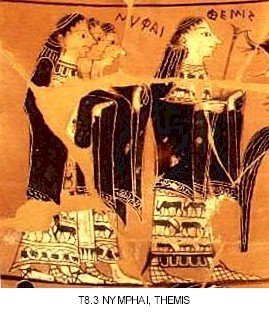
www.theoi.com/Gallery/T8.3.html
Among the oldest objects left by the Ancient Greeks were paintings on vases and other ordinary objects. Our home in California is filled with several modern copies bought in Athens 50 years ago, when I went there on the USS Iowa as a sailor in the 6th Fleet. Then, as now, the Greek culture interests me greatly, but I am finding difficulty finding any wedding ceremony from images on pots.
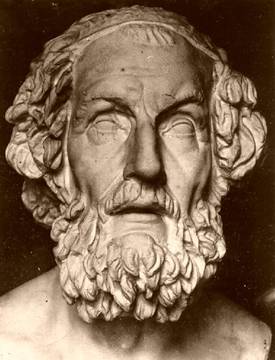
malaspina.com/jpg/homer
Since much of our the awareness of the ancient Greek culture comes through Homer, who told his stories 3,000 years ago, it seemed useful to try find a wedding ceremony from the poems of the master. But when the “Iliad” begins, Helen has already been stolen by Paris; they are already in Troy. Was theirs a “love” marriage, or might it have been one in which Helen was stolen?
I found no wedding ceremony in the poems of HOmer either. Therefore, it seems to be quite difficult, to determine what an ancient ceremony in Greece was like.
In fact, when I imagined Paris with Helen, even from a distance, I wondered if Helen had been taken captive or went willingly, for the choice might determine the kind of wedding that was held as well as the form of marriage that would follow.
Many Greeks took maidens from their home cities and islands by capture, and sometimes these warriors took the maidens home to become wives. I feel certain that love could bring couples together after such abductions. Certainly, one reads that gods and goddesses could unite a couple.
In any case Homer does not tell much about with the wedding of Paris and Helen. He started his poem by recounting the preparations for war, giving what can be called a roll call on the battlefield after the Greeks have landed near Troy. Meanwhile, he takes his readers/hearers to a council of the gods and goddesses who will play a huge role in the oncoming struggle by taking sides with the humans down below, some of the gods and goddess will side with the Greeks and some with the Trojans.
In the Iliad, (chapter 3), we learn of a confrontation and a short duel between Paris, who had already taken Helen to his home in Troy, and Menelaus, who had lost Helen, his wife, to Paris. Her disappearance caused the famous war.
The closest description that Homer gave was a scene of love making, even briefer than the battle, but in the same chapter we find some longing of Helen for her former husband. Then with the help of the goddess Aphrodite, Helen is led to Paris bed and “the two lay down together on the well made bed.”(Homer, Iliad, 63) So we have no wedding ceremony recorded, for this scene seems more like their “honeymoon. Was there a wedding at all? Was Helen ever married to Paris? The single line suggests a nuptial consummation, but was this the first time? Was it the last? Therein abides one of the abiding attractions in Homer's writings in that he can say enough to trust his readers/hearers to let their own imaginations carry them across the “wine, dark seas.”
In Troy, I wondered if I could have been a “wedding crasher”, hoping to see more into the hearts of Paris and Helen than I was granted, or wishing to see if their love was strong enough to have sustained them during of the War in Troy, or was it a fictitious reason for two armies “with no weapons of mass destruction” in either camp for one to have attached the other? I assume every reader of Homer is aware that this connection between Paris and Helen was not the result of a normal marriage, and it may be pointless to look for a wedding scene. But the story of the two does seem to confirm what his translator E. V. Rieu wrote that “Homer's main interest less in the study of human beings and human gods.” He is disposed to “reject the grotesque and the supernormal. The beautiful Helen did not emerge from an egg, and apart from one perfunctory reference to the Judgment of Paris, it was her human frailty and that of her seducer that led to the Trojan War.” (Rieu in Homer, 18). My readers will see that I believe that what Homer wrote was based on historical memories, and I do not follow the 19th skeptics who see Homer as merely fiction. I agree that “Homer’s Iliad and Odyssey are literary creations that nonetheless preserve accurate historical memories.” (Yamaguchi, 37).
That takes me now to the Odyssey, where a reader meets other views of marriage, even the wedding ceremony itself is not to be found. When Odysseus sets out on his long journey from Troy back and forth across the Mediterranean Sea, making a circle and big loop beyond Sicily into the Kingdom of the Dead, through the Charybdis and Scylla (The straits of Messina) and finally home to Ithaca, he is returning to his loyal wife Penelope. His love for her as well as her love and devotion to him looms behind every adventure he makes on the way. Did they promise each other faithfulness in their wedding ceremony which would be equivalent to promises made in later generations on the many islands of Greece, or the civilization that came later after Rome fell, which would make marriage a sacrament and contain the promise, "as long as we both shall live"? Probably not.
Even after Odysseus debarks on Ithaca, he does not bathe, shave, put on his finest clothes to prepare for the celebration of his homecoming. Instead he dresses in the disguise of a beggar and seeks to determine what has transpired in the years he has been at war and on the long voyage home. He was not recognized by his faithful steward Eumaeus. He might have been recognized and killedt by one or more of the suitors to his seemingly widowed wife; for indeed the ignoble band of suitors had plotted to kill Telemachus, Odysseus' only son, would have been the heir to the property and goods any of the suitors might have hoped to gain with a marriage to Penelope.
Even Penelope in her grief amnd sorry did not recognize her disguised husband, and instead she gives him first the gift any stranger might expect as one traveled about ancient Greece, food and water. But something about the stranger, perhaps the fact he appears kind or will soon be leaving for another island, so she starts to tell him of the difficulties in her life as a widow to be forced to pick another husband. The scene is "full of irony and pathos. Penelope unburdns herself to the stranger, telling him of the pressures she reluctanly faces to remarry. Odysseus silently grieves for his sorrowing wife...with a tale that he has recently seen Odysseus (indeed,"himself") whom he predicts will soon return" (Sowerby, 21).
As readers of Homer's poem remember, Odysseus proves his worth, his strength, his true selfhood by being the "true Odysseus" by doing what the suitors had failed to do so. He strings his own bow, which suddendly he puts into action as he and Telemachus start to kill the suitors. What a fabulous moment of recognition, a highlight of many Greek dramatists, to have Penelope at last know her husband has returned as he kills and sends the suitors to the next world. But was it after all? Was this the quality in the man to whom she had been faithful? Was it the fact he would be able and willing to kill her suitors as he had sailed to Troy to avenge the violation of marriage vows made by the kidnapping of Helen by Paris so many years ago? What was Homer trying to convey to his hearers and later readers? Was the end of the two poems an affirmation of marriage vows made in a wedding intended to be a contrast to the violation of such vows made by Paris through Helen? Perhaps, we shall never be sure. But something was said long ago on Ithaca between Odysseus and Penelope which managed to keep them together in spirit in the long years of separation and temptations. Was it a vow of "faithfulness"?
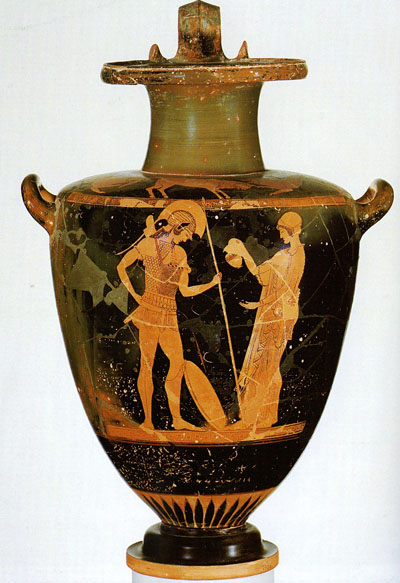
image: greekshector.jpg
( Boston Museum of Fine Arts via color plate 8 in Harris)
Meanwhile back in Troy the wedding of Hector and Andromache is not described by Homer. But the last hours that these lovers spent together is captured in both the Illiad and in Greek art. Their relationship seems one of comparable faithfulness similar to Odysseus and Penelope, if not so long in duration. As Hector prepares for the battle with Achilles "Hector and Andromahe reveal, with their downcast looks, their contemplation of Hector's impending death that Andromache has already predicted" (Harris, color plate 8). The image above (c.475 B.C.) from the Museum of Fine Arts, Boston captures the love of Andromache with her arms stretching out with the cup that will be his last gift from her, while his own weapons signify the pursuit that will separate them forever in this life. Might we also assume that her last gift resembles the first,as wine from a cup?
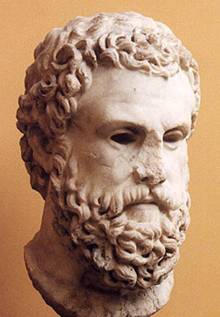
www.nnb.com/aeschylus
In the tragedies and comedies of the Greek theaters, one can find a great deal of insight into life in Greece during the 5th and 4th Centuries before the Common Era. Aeschylus wrote "Agamemnon" revealing the difficulty of a husband returning home after the Trojan War, especially bringing a captive slave as his mistress. Thus we have no chance to see their wedding portrayed on stage, for soon both are slain by Clytemnestra, whose earlier wedding to Agamemnon was also not enacted. But in that play, we feel a powerful sense of the earlier relationship between Agamemnon and Clytemnestra, which was destroyed by the absence in war and the return with a captive mistress. Actually Aeschylus probably used the scene at the end of Homer's poem when the suitors in the Underworld tell of poor Agamemnon. (Sowerby, 22).
"Clytemnestra, who is married to Menelaus's brother, resembles her sister, Helen, in being an equally unfaithful wife, but far more deadly" (Harris, 561). Clearly, Aeschylus intended to show that both Clytemnestra, the sister of Helen through the union of Zeus and Leda had in common an unfaithfulness leading to tragedy. (no pun intended).

gentleworld.org/Plutarch
Later in Greek culture when the Romans had arrived to conquer and to celebrate, Plutarch wrote several biographies of memorable Greeks and Romans but not much on their weddings. Nonetheless, Plutarch wrote an important letter to his wife, at the time their daughter died, thereby suggesting a deep and lasting union in that marriage. Plutarch had just received a report of the death and shared what seems a very personal letter, which has survived the centuries. We learn that his wife had given him four sons, and the “longed for daughter” had been named for her mother (Plutarch, 583). Had the daughter lived to experience a wedding, we might not have had this letter at all, but the letter attests to a high value by this educated and moral Greek author in family life itself.
Reading on, we find that Plutarch had never had “occasion for the one quarrel…(and ) your plainness of attire and sober style of living has without exception amazed every philosopher who has shared our society and intimacy….” (Plutarch, 589). He continues in the tone of consolation to suggest they try to remember a time before the daughter had been born….but not to regret that she had lived with them binging “delight and enjoyment” for which he was grateful (597).
Different laws were in force depending on the place the wedding was held. In Athens, in certain times a wedding which joined an Athenian with a “barbarian” (person from outside Greece) or even another city was forbidden. (Felton, 28). Spartans liked to have mock “abductions” as part of the ceremony, which would have been a heritage of taking brides by conquest in earlier times, even if the bride was also from Sparta.
While the ancient Jews were celebrating weddings is the land of Israel, Greeks were celebrating ceremonies that lasted for three days. On the first day, a formal betrothal (eugyesis) took place between the lord (kurios) of the bride, often her father, and the groom himself, who made a pledge to the bride’s family.
On the second day there were religious sacrifices to the gods of the city and offerings asw ell. Ritual baths were made followed by a feast at the home of the bride, where the groom brought gifts and saw the bride unveiled. In Greece, the groom did not have to wait until after the vows were made to see his bride, and perhaps he could change his mind during the last night, even though he had brought gifts. No mention is made of any priests during the ceremonies, just as in modern Greece, most weddings are performed by civil officials.
Whether the weddings are performed by priests in a church or by civil officials as in the last wedding to be discussed below in this chapter, the classical tradition in which the live their lives, with monuments, temples, ruins, and echos of the voices of gods and goddesses, some brides (and grooms as well) like to have a photo shoot in the proximity of ancient places where their ancestors walked. My favorite in this regard is from the wonderful photos of Lewis as in the one below:
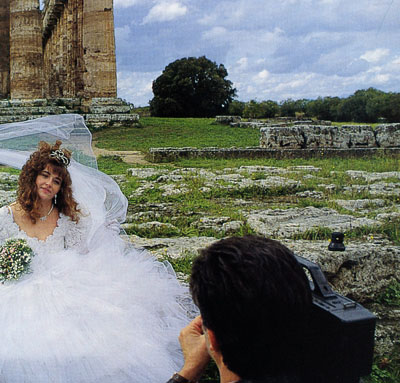
photo:greekwomantemple.jpg ( Lewis, 21).
The power of Hera seems to inspire the bride, or was it the inspiration of the photographer? And this image led me to "crash another wedding" of Zeus and Hera.
The image above capures a modern Greek bride going to the Temple of Hera for a "photoshoot" in which even the head of the photographer seems intentionally revealed. Was this some kind of "subtext"? Might she have travelled there to absorb some of the positive energy at that site from Hera the Goddess of Marriage? Could she have hoped for some magic of the place whereby the wedding day would turn into a successful marriage? Since I did not conduct or attend the ceremony, I will never know!
Nonetheless this image inspired me to ponder more as to what might have been the form of a wedding ceremony between a god and a goddess in ancient Greece. Can we assume that somewhere above the “divided line,” which Plato drew for us, that there was such a ceremony, even if Plato did not reveal it or even imagine it?
In my imagination I wondered what would Zeus, the God of the Sky (and the Thunderbolt), have said to Hera, the Goddess of Marriage (and of the Peacock)? Would such a marriage call for a narration of the accomplishments of each in the “prologue” or “gathering address”? Thus was there a Greek equivalent to ancient Hebrew wedding poems? For example in Psalm 45, which most scholars think was a wedding poem originally written in the time of the monarchy (or monarchies after Solomon) in honor of a Hebrew speaking king to a Phoenician princess. (cf. above the “Wedding of Adam and Eve” regarding this Psalm). Later after the Babylonian Exile, when there were no more Hebrew speaking kings, the Psalm was allegorized to be interpreted as the “Wedding Poem of Yahweh marrying his people” (Huntley, 1964). To be honest, I have found in research on this "album project" so far no clue that such a process took place in Greece, but I might imagine “crashing” the wedding of Zeus and Hera and hearing of their achievements.
If I managed to slip in behind a rock on such a wedding, I do not think that Zeus would have promised to “love and cherish” Hera as his only goddess, although he might promise to stay with her “abide with her” until the birth of Ares. Otherwise Zeus was to mate with Ledo who gave birth to Artemis and Apollo and with Maian, who gave birth to Hermes. In his "wedding" with Dane, Zeus offered a shower of gold to Danae who appeared ready to recieve Zeus in a union that would bear fruit in their child Perseus. Gold in this form could be seen as the wedding gift that accompanies weddings in many parts of the world in ancient times and in the present.
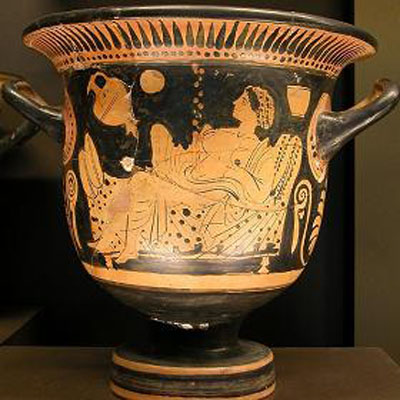
image: danae-greek-crater.jp
This vase-painting entitled "Danae and the shower of Gold (c. 410 BC) is now in the Louvre in Paris (Harris, 351).
Perhaps modern movie stars, at least those inclinded toward serial marriages often with the co-star from their last film together, may think of themselves as the “gods of this century," if not gaining inspiration from Zeus. Perhaps it is from the gods of Greece that humans came to long for more than one mate. Or more likely, the humans who created the mythology of the Greeks projected their own libidos into the realm of the gods whose actions they imagined. In any case the gods of Greece were not limited to only one mate.
Homer told his listeners and later readers more about the union of Zeus and of Hera than any other source I consulted in this “album project.” I learned that Troy did not fall easily because Zeus protected it, and Zeus was “well disposed to the Trojans, particularly to Hector who has always honoured him with sacrifice” (Sowerby, 73); moreover, Hera restrained Zeus from a task he could not perform, because, after all he was not omnipotent (Homer, Iliad, XII). At this point in the imagined ceremony, Zeus looked down and saw me, mere mortal as I am, and immediately he recognized the hybris of my mission and waved a thunderbolt at me; I fled from my venture as "wedding crasher" and returned to the 21st Century to the composition at hand.
Let's look in a different direction for a view of a Greek wedding today. The image below comes from the cover of a children’s book, which I bought in Greece in the summer of 2006 in order to study modern Greek. I have loved picture books from childhood; and my wife, Helen, teaches children's literature, so we have hundreds of such tomes in our home. So please forgive the shocking shift in source materials for this "album project." Thus, now with this source I am using Shakespeare’s play written in England 400 years ago recently revised by a modern Greek children's book author( Brois Kovia) and a modern illustrator(Ntenis Noll). One can observe how modern Greek parents might teach Shakespeare's story about an ancient Greek wedding to modern children. How strange some Greek tourists must have thought, when they saw me reading this book one day on the beach! But they must have been surprised the next day when l they saw a whole crowd of children gather as a modern Greek mother sat down beside me and began to read the story aloud to all of us.

With this beautiful book I came to appreciate not only a story in modern Greek, if on a level of Greek for children, but I also came to appreciate Shakespeare’s rich imagination as he created a play set Athens around 500 BCE. The modern Greek bookseller on Skiathos liked that aspect when she sold me the book. However, Shakespeare seems to have known that a father’s authority could be challenged by children for the sake of love. Was it because he knew English girls in his era with just such spunk? I also learned recently that Shakespeare originally probably wrote the play for a friend who was making wedding plans, and he might even have produced it at the wedding itself.
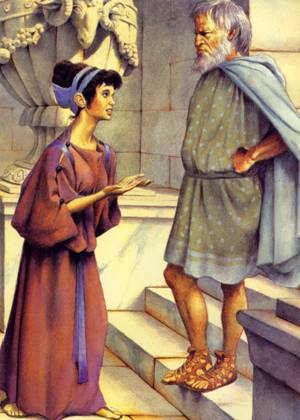
In this illustration above from the children's book we see Hermia asking for a wedding. She tells her father, who knew he was the lord of his family, that it is he who could decide who was a fit groom in ancient Athens. Perhaps like Shakespeare, who imagined that he lived in ancient Greece, children in Greece today could imagine the look of displeasure showing on this father’s face, when his daughter, Hermia, told him she preferred Lysander to her father’s choice.
Soon Oberon and his little friend Puck come to the rescue of Hermia, and with a magic drug taken from a local plant when dropped onto the bodies of sleeping human, they fall in love with the first person whom they see upon awakening.
.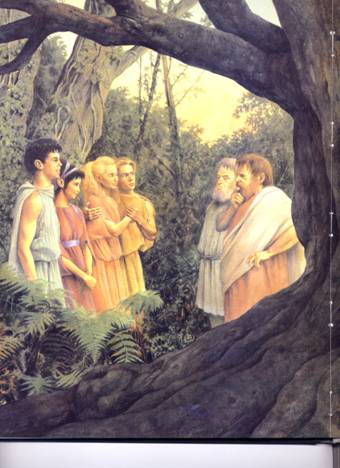
All turns out well at the end, and we read of the double wedding for Hermia and Lysander; meanwhile Helen weds Alexander; and the two fathers act as witnesses. Puck seems playful and happy in this children’s book version of William Shakespeare’s “Oneiro Kalokairines Nuxtas” (“Dream of a Summer’s Night”); perhaps because it was his magic of bringing the the two couples together and convincing the fathers that that love was more useful in the long haul than being forced by the fathers to wed the wrong mate. Certainly Shakespeare gave a setting and plot to their love as did the Greek book editor.
Otherwise during my vacations on Skiathos, I often reflected on my wedding album project. Recently I participated in two "real life" weddings in Greece. One took place in June 2008 when Luc Diggle wrote me that spring asking if he managed to get to Greece with his partner Jessica, would I conduct a ceremony. I responded postively since Luc had been a student in at least five courses I taught during the four years he was my advisee. I had never met Jessica, but she and Luc had been friends from a Massachusetts high shool. Moreover she had been the person who got Luc a job as a baker, when he returned to Massacusetts upon graduation from the University of Redlands. I especially liked that little touch.
For the wedding setting, I asked them to come to Skiathos for this "destination wedding. " Luc wrote telling me when he and Jessica were planning to be in Greece, and I resonded telling him that I doubted that we could get the wedding license in the few days when we would all be there. But that seemed to be no problem to them for they were not bringing any guests or friends.
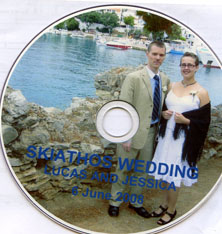
lucnjessicadvdcover.jpg
The setting for the wedding was captured on the DVD cover above by our British friend John Fearon. Luc and Jessica are standing on the Bourzi in Skiathos, formerly aTurkish mini-castle, now an ampitheatre and restaurant. The background may seem familiar to anyone who saw the film "Mama Mia', for it was this same boat dock in the background from which the group of three perspective fathers set out for "Donna's villa" in that film
I conducted a very informal ceremony in which I asked a good friend from England, Bob Gillespie, to read I Corinthians 13, then had Luc and Jessica tell how they met, came to love each other: then they told why they picked Greece as their wedding setting. Since only Helen and I had known Luc and Jessica before that moment, it was a useful device to have them introduce themselves to the gathering of six friends of our who happened to be in Greece that week during their holiday to attend the ceremony and reception following. In the image below Luc seems thoughtful and reflective as he told how he and Jessica had met in high school and upon returning to his hometown upon graduation from the U. of Redlands, they met again and worked in a bakery. They returned to Massachusetts following the ceremony and then moved to San Diego where Luc is working toward a certificate in Chinese medicine.

image: 2008jessicaluc#1.jpg
Following the words and music we shared, we went to the office of the mayor of Skiathos and learned we should have begun the process many months earlier to obtain a wedding license in Greece. This has led me to wonder if the local officials do not sign the legal documents for a wedding ceremong, was there really a wedding? I think now after two years of reflecting on the question, it would be better to call what happend that June day as a kind of" blessing". If they choose thereafter back in the USA to have the wedding "official" according to the laws of Massachusetts or California, then it is more like a rehearsal in Greece.
The next June in 2009 on Skiathos, I was able to participate in another wedding. In fact they were two of the British people discussed in the wedding above, and we had met the couple five years earlier at a joyful "Greek Night" celebration in the Nostos Taverna. They are Rob Neufeld and Bairbe Gray; Rob is a business man fron London, and she is a nurse in London who had been born in Ireland. What I noticed about Rob was the way demonstrated a very high degree of caring for Bairbe, who had broken her leg. At the Taverna and day after day, Rob carried her in his strong arms and brought food and drink for her at the beach.
As her leg healed they continued to come the same week to Skiathos in June for four more years. My wife and I did as well. In fact, our families bought an "extra week" in the RCI Timeshare deal from the same famous "Alfredo" the persistent salesman.
So it was a great pleasure to be invited to their wedding on the beach we all enjoyed so much. Through them I also discovered some of the difficulties of actually having a wedding in Greece. They went to the office of the mayor of the island and discovered it would be a very complicated process to have the wedding be a legal one in Greece. It would take them just about one year to complete all the details. First, both partners must get birth certificates notarized, then both must be translated into Greek, then both must have a document affirming the translations were accurate and notarized. Each step costs about 100 Euros. If either of the couple had been married before, then those wedding licenses had to be presented, then translated into Greek, then the translations must be notarized, with additional costs. Moreover, since both Rob and Bairbe were married before. Their documents of divorce had to be collected and notarized, translated, and authenticated for each, as the fees build up.
Yet to make the process even more complicated was the fact that Barbie had been born in Ireland which is not a member of the EU (European Union) and that demanded even more documents. One can see that a Greek wedding is not easy to legalize, with an endless array of documents. I came to the opinion that the Greek government policies demanding even on this little island of less than 5,000 permanent residents was keeping a number of people busy, here and in the London and Dublin offices.
In the image to the right Rob is showing how difficult it is to get a Greek wedding ceremony legalized.
image: 2009greekrobdocuments.jpg
But at last all is set in place for the wedding at Nostos. Rob asked me if I would take a look at the ceremony that would be used by the mayor, and I went to his office to see what would be used.
Below is the text I received from the office of the Mayor of Skiathos:
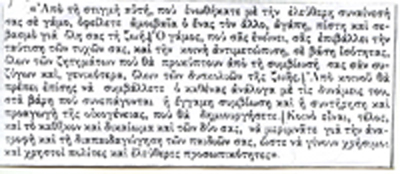 greekceremony. jpg greekceremony. jpg

2009robbarbceremoney.jpg
When the vice-mayor arrived, we started the ceremony. But the vice-mayor seemed to want the whole ceremony performed while seated at a table as he read from the Greek text above, but I asked the bride and groom to stand as I read from my own translation of the official Greek document of a civil marriage as follows:
"From this moment that you join in marriage, coming of your own free will, you bring to each other equally (the following): Love, faith and respect from now for the rest of your lives.
"The marriage which unites you brings together your destiny (Greek MOIRA) and causes you to have a public and equal reaction to the joys and difficulties (you will meet) as you share your life together.
"(Living) together you are to do what is necessary to contribute (SUMBALLETE) each according (to his or her)ability or power (DUNAMEI) to the needs you create by your living together (SUMBIOSIS). You are to maintain and protect your family.
"Finally, you are to do what is right as a duty to take care (in) the upbringing of your children in your care so that they many become useful (XRISIMEI) and virtuous (XRISTOI) citizens with personalities of free spirits. "
Then I asked them to exchange their rings, which they did and so I asked if they agreed to live together according to the words of the English translation of the Greek ceremony. Each affirmed, "I do." Whereupon we all looked at the vice-mayor, who looked both pleased and puzzled. The ceremony was over.
They still needed to sign one more document the next morning in the mayor's office, but their wedding was now legal, after which we all lined up on the beach of Nostos.
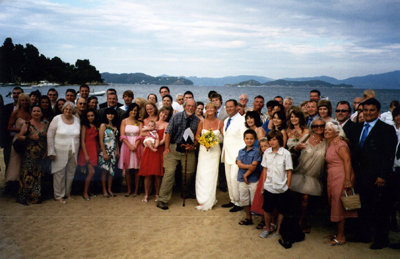
imge: 2009robnbarbbeach.jpg
Now a year passes and I can comment on reflection that several of the connections to earlier Greek traditions are of interest to me. For example, in paragraph #1 above, I felt an echo from St. Paul's letter to the Corinthians of "faith, hope and love" in the modern Greek ceremony with "love, faith and respect."
Then in paragraph # 2, I found the notion of MOIRA "destiny" compelling. The concept of destiny might be consider as being shared from the moment of the wedding forward into future time. Thus the past "destiny" which brought them together is now replaced by what the couple can make of their life together.
I liked the assonance in the Greek text with SUMBALLETE "you will contribute" to your SUMBIOSIS" life together" in one line and again XRISIME as "useful" having a connection to XRISTOI "virtuous."
I know that translating the line as "personalities of free spirits" is a little stretch from the Greek text, but Rob and Bairbe both liked it. Following the affirmation of the vows and the pronouncement, the whole group moved to the beach and then to Johnny's Taverna next door. In he image below, the couple looks as happy as any I have ever seen. The taverna owner claps on the right.
robbar5.jpg
.
My pictures of this wedding are as joyful to look at again as was the reception which followed the wedding ceremony. Especially pleasing to me is the one of the best man. Indeed, he was the very best best man in any wedding I ever attended or wrote about. Here he beams at the success of the wedding and the toasts thereafter that he offer. Julian Tyler is a price of a guy! And his face reflects the joy of the evening, if accented by the presence of the two blondes who appreciated his toasts as much as I did.
.
Oisin Gray, in the photo below, seemed to be as pleased as I was to celebrate at his daugher's wedding. . I do not remember the name of the little bear or who brought him, but he also seems pleased. This wedding brought strong lingering connections to my life the following summer, for when I took 20 students and fellow travellers to Dublin in May 2010 Oisin Grey led us on a tour through the district famous for the Georgian architecture.

2009robsfather.jpg
Also happy was the whole delegation of young people from Ireland who had come to Greece for the first time in their lives in this "destination wedding"
 2009robirishcousins.jpg 2009robirishcousins.jpg
Finally, the Greek wedding in Skiathos led to a birth in England of Rob and Bairbe's daughter Katie, who affirmed the [marriage with her very existence when I visied her family in May 2010. There in Kent, she seemed a little frightened of me, or my beard, but she did not cry.

image: 2009Greekkatie.jpg
The next day Rob, the bridegroom and now the father, and his best man, Julian Tyle,r came to London to meet my Ma tyerm class as St. Paul's Cathedral and led us a tube stop nearby to describe what life would have been like in 1940, when the Luftwaffe bombers were dropping bombs, hoping to destroy the Cathedral, for St. Pauls was symbol of London and the whole English speaking world.( One may wonder what all this has to do with my discourse on weddings, but the birth of Katie is clearly connected to the wedding we celebrated the summer before on Skiathos and is an indication of my zeal to stay in touch with those with whom I share a wedding day. In fact, that is just what this "album project" is all about!" thanks Katie for the reminder of what I am trying to do.

When Rob brought his daughter to meet my who class that May day, she smiled with grace at all of us. Then the next day Rob came again to the class to take us to see the changing of the guard at Buckingham Palace. All the while Rob was doing business on his cell phone, demonstrating his life as an English business man working the global scene. I was impressed with his dilligence in working the cell phone, and although we did not get to see the queen in her chariot, at least the horse guard came within 10 feet of us. Thanks for inviting us to your wedding, Rob and Bairbe, and thanks also in sharing three days in London almost a year later. You wedding brought great joy in the birth of your daughter which you were able to share with my unwitting pilgrims on the same road that Chaucer tred, if in much less a poetic pace.
That ends my commentary on Greek weddings so far, so let's make a big jump to the the Romans, who inherited a good deal from the Greeks, including art, poetry, and ideas about family life. The father in a family was the paterfamilias who had even more power than the Greeks. Is laws for which the Romans are famous, the system provided for honor and respect for the family lineage. Indeed, until he experienced his own wedding day, a young Roman man could not be a citizen, although in some cases there were emperors who were not yet wed. In order to have children to keep the lineage going into the next generation, Romans made laws with allowed a man to have sex with prostitutes, concubines and slaves, even homosexual encounters, if they could be seen as leading to children, which does seem unlikely.
(Piar, 29)
"Married couples among the Roman elite lived in a social system in which the family, as modern societies think of it, did not exist. The Roman familia meant a household, not a family in the modern sense, and households came in a great variety of sizes and shapes. Among the wealthy and powerful, the household often numbered hundreds of persons and things: children, servants, slaves, livestock, and other property were all part of the familia, although his wife and children were members of it and, like the servants, and slaves, oxen and geese, and the rest of the familia, they belonged to the paterfamilia. Among the poor, however, households were apparently small, since they included no slaves or servants and little property. The familia of the humble often consisted simply of a woman and her children. Again, the male head of household was not part of his own familia." Sex, and Christian Society in Medieval Europe
Marriage was important in ancient Greece and Rome. We think of city states as somewhat weak in Greece, with shifting alliances, and sometimes won battles, often followed by losses. The success of the recent film “300” about ancient Greek struggles is a testimony to the lingering effect upon us moderns. Is the film's success the result of our own failures in Iraq? Certainly to reproduce our losses in battle, it was important then, as now, for the success in political, economic, and religious struggles for families to have children, especially boys for the battles, but women were the bearers of these children, so their lives were regulated as well by the state. “The Athenian law, in the name of religion, forbade man to remain single" (de Coulanges, 220 quoting Pollux VIII.40. Plutarch, Lysander, 30)
In Sparta, from whence came warriors of the recent film, “300,” there were punishments rendered to those who remained single, or even for those who married late. “Sparta regulated the head dress of women and those of Athens forbade them to take with them on a journey more than three dresses.” (de Coulanges, 220). For those of us traveling among the Northern Europeans who flee the dismal summers north of the Alps and have made Greece their “Florida” with sunshine, we wonder why so many garments must be stuffed into bags, then must be checked and hauled through airports and onto busses. I would suggest we make all tourists, men as well as women, go back to the “three dress rule of ancient Athens.
Perhaps my readers will have seen to the film “A Big Fat Greek Wedding" and wonder why I don't comment. I have seen it but think it shows more about the American setting than Greece.
|